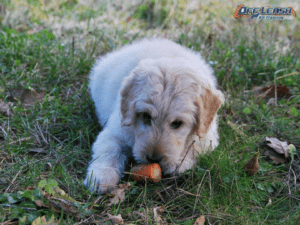Discover some of the fruits and vegetables that can benefit your dogs health, including apples for fresh breath, bananas for bone health, blueberries for cognitive function, and carrots for weight management, along with tips on integrating them into your dogs diet for optimal well-being.
Introduction to the Benefits of Including Fruits and Vegetables in Your Dog’s Diet
A well-balanced diet is fundamental to maintaining your dog’s health, vitality, and longevity. Incorporating the right fruits and vegetables into their diet can play a significant role in ensuring they receive essential nutrients not always available in commercial dog food. These natural foods are packed with vitamins, minerals, and antioxidants, which are key to supporting various bodily functions. They can enhance a dog’s immune system, improve skin and coat health, aid in digestion, and even offer protection against certain diseases. Moreover, many fruits and vegetables contain phytonutrients, which have been shown to offer additional health benefits, including anti-inflammatory and anti-cancer properties.
Safe Fruits for Dogs
 Apples
Apples
Apples are a fantastic snack for dogs when served in moderation. They’re packed with vitamins A and C, as well as antioxidants, which can help boost your dog’s immune system and overall health. However, it’s important to remove the seeds before offering them to your pet, as they contain cyanide and can be harmful. A fun fact about apples is their ability to freshen a dog’s breath, thanks to their texture and cleansing properties.
Bananas
Bananas are rich in magnesium, a mineral that’s essential for a dog’s bone health. They’re also a great source of vitamin C, potassium, and fiber, making them a healthy, low-calorie treat. However, due to their high sugar content, bananas should be given to dogs sparingly.
Blueberries
Blueberries are known for their high antioxidant content, which can support cognitive function in senior dogs and have anti-inflammatory properties beneficial for dogs with arthritis. Incorporating blueberries into your dog’s diet can help them maintain good health as they age.
Watermelon
Watermelon is a hydrating fruit that’s perfect for hot days, being made up of 92% water. Before feeding watermelon to your dog, ensure to remove all the seeds to prevent the risk of intestinal blockage. The rind, while tough, can be given in small amounts as it’s low in calories and high in fiber.
Beneficial Vegetables for Dogs
Carrots
Carrots offer numerous benefits for dogs. They are low in calories, making them an excellent choice for weight management. Rich in beta-carotene, carrots can support eye health and reduce the risk of certain diseases. Chewing on carrots can also promote dental health by gently cleaning the teeth.
Green Beans
Green beans are a superb vegetable choice for overweight dogs due to their low caloric content and high nutritional value. They’re packed with fiber and vitamins, aiding in blood sugar regulation, which is particularly beneficial for diabetic dogs.
Pumpkin
Pumpkin is a versatile vegetable that’s beneficial for dogs with digestive issues. It’s a natural source of soluble fiber, which can help manage both constipation and diarrhea. Pumpkin seeds, rich in antioxidants and essential fatty acids, can also be fed to dogs as a natural dewormer.
Fruits and Vegetables to Avoid
Understanding which fruits and vegetables can be harmful to your canine companion is paramount in ensuring their health and safety. For instance, grapes and raisins are highly toxic to dogs and can result in sudden kidney failure, a condition that can be fatal if not treated immediately. Similarly, onions belong to the Allium family and contain compounds like N-propyl disulfide, which can lead to oxidative damage to red blood cells, causing anemia. This damage can manifest as weakness, lethargy, and in severe cases, could necessitate a blood transfusion.
Citrus fruits such as limes and lemons have a high acidity level that can disrupt a dog’s digestive system, leading to stomach upset, vomiting, or diarrhea. It’s crucial for pet owners to be vigilant and avoid offering these fruits and vegetables to their dogs, adhering to safer dietary options to maintain their pet’s health and well-being. For those seeking advice on crafting a balanced and safe diet for their dogs, consulting with professionals at Off Leash K9 Training of Phoenix can provide invaluable guidance and peace of mind [https://phoenixk9trainers.com/].
The Role of Phytonutrients in a Dog’s Diet
Phytonutrients play a crucial but often overlooked role in enhancing a dog’s diet. Found abundantly in fruits and vegetables, these natural compounds include carotenoids and polyphenols, each offering a suite of health benefits that can significantly improve a dog’s well-being. Carotenoids, for instance, are not only pivotal in bolstering the immune system but also play a vital role in maintaining optimal eye health. A prime example of a carotenoid-rich vegetable is the carrot, known for its beta carotene content, which the body converts into vitamin A, an essential nutrient for maintaining healthy vision.
Beyond the immune and vision benefits, phytonutrients like polyphenols offer powerful anti-inflammatory properties, making them particularly beneficial for dogs suffering from arthritis or other inflammatory conditions. Fruits such as blueberries are teeming with these compounds, providing not only a tasty treat but also a natural way to alleviate discomfort associated with joint issues. The inclusion of these nutrient-dense foods in a dog’s diet, under the guidance of professionals like those at Off Leash K9 Training of Phoenix, can pave the way for a more holistic approach to canine health.
Integrating Fruits and Vegetables into Your Dog’s Diet
Adding fruits and vegetables to your dog’s meals introduces a wealth of vitamins, minerals, and antioxidants that contribute to their overall well-being. One creative way to do this is by freezing fruits such as blueberries and watermelon. Not only does this method offer a cool, hydrating snack during the warmer months, but it also makes for a fun, lickable treat that keeps your dog entertained and nourished. These frozen fruits can act as a natural sweet treat, providing hydration and essential nutrients without the added sugars found in commercial dog treats.
Moreover, incorporating vegetables into your dog’s diet doesn’t have to be a chore. Simple practices like mixing steamed carrots and green beans into homemade dog treats can significantly enhance the nutritional value of their snacks. Steaming vegetables is particularly beneficial as it softens them, making it easier for dogs to digest while preserving the essential nutrients that raw vegetables offer. This method ensures that your dog can absorb all the beneficial vitamins and minerals needed for a healthy diet. Additionally, Off Leash K9 Training of Phoenix suggests that integrating a variety of fruits and vegetables into your dog’s diet not only supports their physical health but can also be a fun way to strengthen your bond through shared food experiences.
Conclusion: Promoting Your Dog’s Well-Being Through Nutritious Fruits and Vegetables
Incorporating fruits and vegetables into your dog’s diet is more than just a trend; it’s a step towards enhancing their health and extending their lifespan. These natural foods are packed with essential vitamins, minerals, and antioxidants, which can aid in preventing various diseases and maintaining optimal health. However, understanding the right mix and portions is crucial, as each dog’s nutritional needs can vary based on their size, age, and health conditions.
At Off Leash K9 Training of Phoenix, we believe that a well-fed dog is a happy and healthy dog. Our team of experienced trainers and certified nutrition experts are dedicated to helping you make informed decisions about your dog’s diet, ensuring they get the most out of every meal. Don’t hesitate to reach out for personalized support in promoting your dog’s well-being through the power of nutritious fruits and vegetables.


 Apples
Apples
